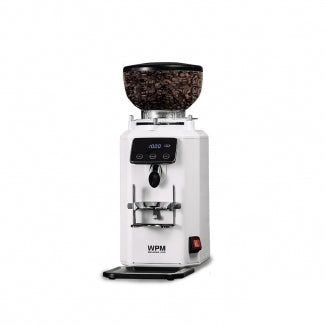Maximize Efficiency with an Industrial Coffee Grinder in Your Business
Maximize Efficiency with an Industrial Coffee Grinder in Your Business
Blog Article
Industrial Coffee Mill Overview: Boost Effectiveness and Top Quality
In the competitive landscape of coffee production, selecting the ideal industrial coffee mill plays a crucial role in boosting both efficiency and product top quality. Recognizing the subtleties of different grinder types and vital functions-- such as personalized work settings and robust building and construction-- can significantly influence the last flavor profile of the coffee. Furthermore, the optimization of the grinding process, coupled with persistent upkeep, is important for sustaining performance with time. As we check out these crucial elements, it ends up being evident that the implications extend past mere equipment selection, influencing total organization success in manner ins which necessitate closer assessment.
Comprehending Mill Kinds
When picking a commercial coffee mill, understanding the various kinds offered is critical for maximizing both flavor extraction and operational effectiveness. The 2 key types of mills are blade mills and burr grinders.

Eventually, picking the best sort of grinder is essential to keeping top quality and effectiveness in coffee production, making it important for organizations to buy premium burr grinders for optimal outcomes.
Trick Functions to Consider
Choosing an industrial coffee grinder calls for mindful consideration of a number of crucial features that can substantially affect both performance and the general coffee experience. Among the main facets to assess is the grinding mechanism. Burr mills are usually favored over blade grinders, as they supply a consistent work size, which is crucial for optimum extraction and flavor.
Another vital attribute is the grinder's capacity. A flexible mill with several setups enables you to tailor the work dimension to different developing techniques, boosting the coffee's taste account.
The construction product likewise contributes in sturdiness and upkeep. Stainless steel parts often offer long life and are less complicated to cleanse, which is important for preserving health criteria. Finally, review the grinder's noise degree, especially in a hectic coffee shop or manufacturing setting, where too much noise can be disruptive. Purchasing a grinder that balances these features can substantially improve both functional performance and the quality of the coffee offered.
Optimizing Grinding Refine
To attain the finest outcomes in coffee prep work, enhancing the grinding process is crucial. The grind dimension considerably affects removal, flavor, and overall high quality of the made coffee.


Additionally, monitoring the grinding speed can maximize the process. Slower grinding commonly produces less heat, protecting fragile flavors and scents. Conversely, much faster grinding might produce extreme heat, adversely influencing the coffee's quality.
Maintenance and Care Tips
Appropriate maintenance and care of industrial coffee mills are essential for making sure optimal efficiency and durability. Normal cleaning is the foundation of upkeep; residue buildup can influence flavor and grinding performance. It is advisable to cleanse the mill after each use, cleaning down the outside and eliminating any kind of coffee grounds from the burrs.
Furthermore, inspect the grinding burrs for wear and tear. Boring burrs can endanger grind consistency, so they need to be changed as needed. Industrial Coffee Grinder. Periodically calibrating the grinder is additionally vital, as this keeps the preferred work dimension for various brewing techniques
Lubrication of moving components ought to be performed according to the supplier's specifications, as this lowers friction and prolongs the life of the devices. It is vital to use food-grade lubricants to ensure safety and compliance with health and wellness guidelines.
Finally, maintain the mill in a steady and dry atmosphere to stop corrosion and additional info rust. By sticking to these maintenance and care suggestions, drivers can boost the performance of their commercial coffee grinders while ensuring premium result and expanded functional life.
Return on Financial Investment Analysis
Evaluating the return on investment (ROI) for industrial coffee grinders is important for businesses seeking to enhance their coffee manufacturing abilities. A complete ROI evaluation assists determine the monetary viability of buying high-grade mills, enabling organizations to consider the first expenses against prospective gains.
Examine the purchase rate of the mill, including installment and any kind of required adjustments to existing facilities. High-performance mills typically lead to reduced grinding time and boosted throughput, which can dramatically enhance performance.
In addition, wikipedia reference consider the effect on product quality. Industrial Coffee Grinder. Superior mills generate a more constant work dimension, which can enhance taste accounts and consumer satisfaction, inevitably driving sales. By enhancing the top quality of the last product, organizations can justify greater prices, bring about increased income
Final Thought
In recap, an industrial coffee mill plays an essential duty in improving both performance and product high quality within coffee manufacturing. Inevitably, the strategic financial investment in a reputable mill adds dramatically to enhanced earnings and competition in the coffee market.
In the affordable landscape of coffee manufacturing, picking the ideal industrial coffee grinder plays a critical function in boosting both performance and item top quality. The two primary types of grinders are blade mills and burr grinders. Within the burr mill category, there are level burr mills and conical burr grinders, each with its benefits. Burr grinders are usually chosen over blade grinders, as they supply a constant work size, which is crucial for ideal removal and flavor.
In summary, a commercial coffee mill plays a pivotal function in improving both performance and item quality within coffee manufacturing.
Report this page